
Feminist talk
Beyond Deterrence: Understanding the Chilling Effects of Technology-Facilitated Gender Based Violence
Technology-facilitated gender based violence has a direct impact on women and gender diverse folks' ability to navigate digital spaces freely. It not only hinders their experience of being connected, but also forces them to self-censor as well as employ patriarchal characteristics of a 'good girl' in attempts to stay safe from violence that comes with speaking up. Amrita Vasudevan discusses.…
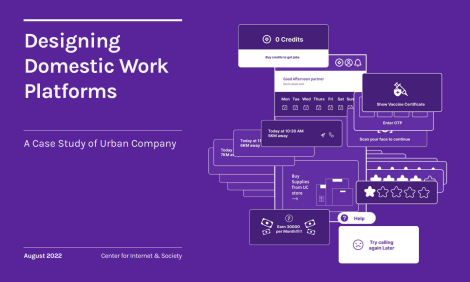
Feminist talk
How Platform Design Shapes Working Conditions in India: A Case Study Of Urban Company
Conversations about service delivery apps are usually centred around how customers experience these apps, but rarely do these discussions explore and examine the conditions service providers work in. The study by The Centre for Internet & Society analyses one platform, Urban Company, in India for its treatment of domestic workers who register on the app to provide services on the company's…

Feminist talk
Lack Of A Data Protection Law Puts Indian Abortion Seekers At Risk
India recently withdrew its data protection bill, putting the data of over a billion people at risk. The already vulnerable individuals became more susceptible to data misuse, especially those already under threat of being targeted for personal choices or identities. This article explores how lack of data protection puts abortion seekers at risk in a society that rejects abortions.
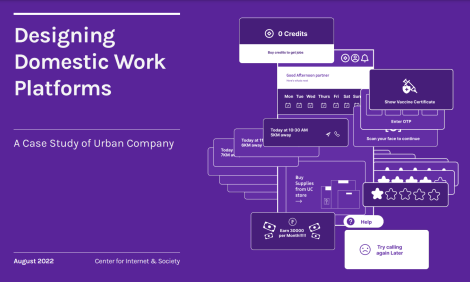
Publication
[Research] Designing Domestic Work Platforms in India
The research shows that the introduction of technology brings with itself the same problems that haunt other sectors of platform-mediated gig work. On-demand platforms seek to exert control over most points of the service delivery process, including job distributions, client selection, worker pay and performance evaluation, all the while relegating workers to an independent contractor status…

In depth
Sexual assault and digital evidence in India (Part 2): Your right to privacy versus the right to complain
In the second and last part of this in-depth article, the author unpacks the persistence of rape myths in judicial reasoning, even veiled under the promises of neutrality and accuracy of digital evidence.

In depth
Sexual assault and digital evidence in India (Part 1): Is electronic data determining whether a woman has been raped or not?
This insightful piece highlights how digital evidence is overwhelming the legal and judicial imagination by looking specifically at cases of rape trials in India.
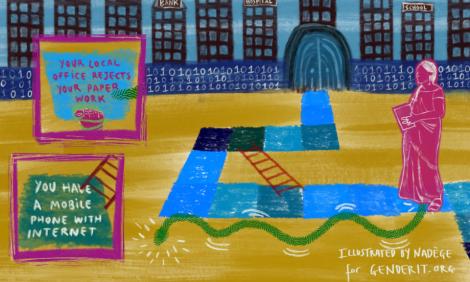
Feminist talk
Transgender Act in India: A law that replicates existing challenges with digitisation?
In India, the digitisation drive of services interlinked with offline violence, marginalisation and stigma make it almost impossible for transgender persons to be considered as people who deserve equal rights. Through the provisions mentioned in the Transgender Persons (Protection of Rights) Act 2019, this article gives us a glimpse of human rights violations and denial of a life with dignity…
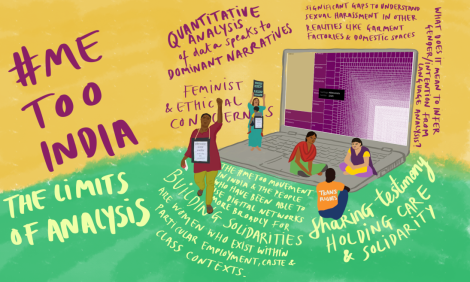
In depth
#MeToo India: The limits of analysis
In this paper, researcher Nayantara Ranganathan analyses tweets with the hashtag #metooindia, and examines the possibilities, limits and contradictions of studying a movement through a dataset of tweets centred around a phrase.
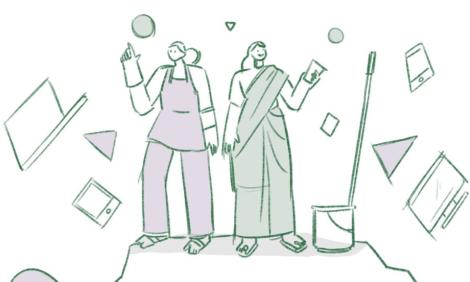
Publication
Platforms, Power, and Politics: Perspectives from Domestic and Care Work in India
In this final report, CIS India shares the findings and recommendations of a 2-year research project studying the entry of digital platforms in the domestic and care work in India, as part of the Feminist Internet Research Network.

In depth
How helpful are helpline numbers?
COVID-19 pandemic has led to a spike in gender-based violence in India. Helpline numbers and digital tools have been used to reach out to survivors, given the absence of physical services. But those women who cannot use phones, email or social media are most likely to be entirely excluded from these systems.
This piece was written as a part of a CIS project.




